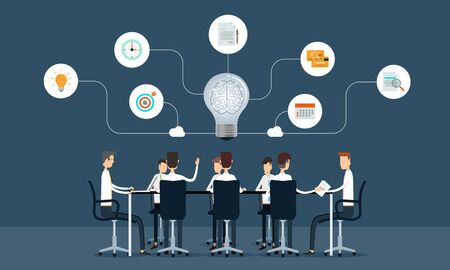《财富》头脑风暴健康大会的6个耀眼瞬间

|
健康很重要。这是230位全球顶尖的医疗卫生思想家、科学家、企业家和投资者在令人大开眼界的两天讨论之后得出的最后结论之一。今年,第二届《财富》年度头脑风暴健康大会在圣迭戈举行,人们关注的焦点是变革性的技术和创意,以及实现它们的公司。IBM沃森健康(Watson Health)的黛博拉·狄桑卓和李维斯(Levi Strauss & Co.)的奇普·博夫等杰出商业人士都表示,思维模式的转变,使得关注员工幸福感成为了核心。而在会议过程中,另外两个想法也成为了人们的焦点:其一是人们表现出了普遍的谦逊,认为我们对人类的健康问题仍然知之甚少;其二是数字健康革命,如果使用得当,可以前所未有地加快人类探索未知的速度。 小达雷尔·斯塔基,洛杉矶闪电队(Los Angeles Chargers) “比赛开始前,我的心率达到了顶峰,随后在比赛中慢慢平复下来——那场比赛进入了加时。” 小达雷尔·斯塔基,现洛杉矶闪电队队员 美国橄榄球联盟(NFL)正使用Whoop的联网腕带来测量他的身体在压力下的恢复速度。他说:“如果你在上床前喝了点酒,恢复的速度就会严重下降。” 马克·贝托里尼,Aetna的首席执行官 Aetna的首席执行官马克·贝托里尼的儿子在16岁时被诊断出患有一种罕见的淋巴瘤,医生劝他放弃治疗的希望。贝托里尼在与时代公司(Time Inc.)的艾伦·莫里的一次坦诚的交流中谈到:“医疗体系把他看作一种疾病,而不是我的儿子。”他说,这只是美国体系把健康仅仅认为是“没有疾病”,而不是感到幸福的许多失败的例子之一。尽管Aetna最近宣布在2018年退出所有可支付医疗法案(ACA)的保险交易,但贝托里尼表示他不认为奥巴马的医改会被撤销。他对参会者说,我们需要的是“承认它需要修改”,然后去修改它。 乔·拜登,前美国副总统 “在沙盒里你们不会万事顺利。” ——前美国副总统乔·拜登 参会者在一个晚上轻松愉快地讨论了癌症的登月计划、高档药的价格和政治明星不去竞选总统的扭曲决定。前美国副总统乔·拜登对《财富》头脑风暴健康大会的联合主席大卫·阿古斯和其他全神贯注的生物制药公司高管、投资者和其他医疗保健利益相关者表示,现在是时候联合起来加入对癌症的战争了——而他将会继续自己的努力。拜登引用约翰•菲茨杰拉德·肯尼迪的登月演说,明确表达了自己的立场:“我们不应该再推迟了。” “Taboo”杰米·戈麦斯,黑眼豆豆合唱团成员 黑眼豆豆合唱团的成员“Taboo”杰米·戈麦斯表示:“我们不听身体的话。”这位音乐家2006年从舞台上摔下,多年来腹部和背部感到疼痛,但他毫不在意。2014年,他被诊断出睾丸癌,这让他好好清算了一下过去,并开始了一段新的生涯。他如今致力于呼吁给美国医疗体系长期忽视的群体——美洲印第安人提供疾病预防、早期诊断和更好的医疗服务。 拉吉·旁遮普,Last Mile Health的首席执行官 “你不可能轰炸埃博拉病毒,或是建一堵墙阻止它。” 这句话出自Last Mile Health的首席执行官、内科医师拉吉·旁遮普,他生动有力地阐述了“不为所有地区的所有人进行医疗投资的真正后果”。旁遮普和他的同事纳希德·巴德利亚博士2014—2016年间身处抗击埃博拉病毒的第一线,努力阻止了它的蔓延。巴德利亚是波士顿顶尖的传染病专家,她表示我们需要改变阻止疾病爆发的文化:我们不能一直“追逐一个又一个的病原体”。 亚当·格萨里,医学博士、哲学博士 “95%的人每天平均有三分之一的时间要处理多项任务。” ——亚当·格萨里,医学博士、哲学博士,加州大学旧金山分校神经科学影像中心主任(财富中文网) 本文的另一个版本将发表于《财富》2017年6月1日刊。 译者:严匡正 |
Wellness matters. That was one of the definitive conclusions reached after an eye-opening two days of discussion with 230 of the world’s leading health care thinkers, scientists, entrepreneurs, and investors. The second annual Brainstorm Health gathering in San Diego focused on the transformative technologies and ideas happening right now—and on the companies making them happen. At the heart of this changing mindset is a new focus on worker well-being, said business luminaries ranging from IBM Watson Health’s Deborah DiSanzo to Levi Strauss & Co.’s Chip Bergh. And over the course of our meeting two more ideas kept rushing to center stage: One, there’s a widespread sense of humility about what we still don’t know about human health. And two, the tools of the digital health revolution, if used appropriately, can accelerate the search for those answers as never before. Darrell Stuckey Jr., Los Angeles Chargers “My heart rate peaked right before the game, and it gradually went down during the game—and that game went into overtime.” —Darrell Stuckey Jr., of the now–Los Angeles Chargers. The NFL safety is using Whoop’s Internet-connected wristband to gauge how quickly his body recovers after stress. “Recovery drops dramatically if you have a couple of drinks before bed,” he says. Mark Bertolini, Aetna CEO Doctors told Aetna CEO Mark Bertolini to give up hope after his son Eric was diagnosed at age 16 with a rare form of lymphoma. “The health system viewed him as a disease rather than my son,” said Bertolini in a candid talk with Time Inc.’s Alan Murray. That is just one of the many failings in a U.S. system that considers health the mere “absence of disease” rather than the presence of wellness, he said. Though Aetna has recently announced it will withdraw from all ACA insurance exchanges in 2018, Bertolini said he didn’t think Obama¬care would be repealed. What we need to do instead, he told the gathering, “is admit that it needs to be fixed.” And then fix it. Joe Biden, Former Vice President “You don’t all play well in the sandbox.” —Former Vice President Joe Biden On a clear brisk night there was talk of cancer moonshots, of stratospheric drug prices, and of a political star’s wrenching personal decision not to run for President. Former Vice President Joe Biden toldFortune Brainstorm Health cochair David Agus and a rapt audience of biopharma execs, investors, and other health care stakeholders that it was high time to cooperate and collaborate in the war on cancer—and that he would continue his efforts here. Quoting a line from JFK’s moonshot speech, Biden made his own message clear: “We should be no longer ready to postpone.” Jaime 'Taboo' Gomez, Black Eyed Peas “We don’t listen to our bodies,” said Jaime “Taboo” Gomez, of the Black Eyed Peas. The musician ignored the pain he’d had in his abdomen and back for years, attributing it to a stage fall in 2006. A 2014 diagnosis of testicular cancer brought him to a personal reckoning—and a new crusade. He’s now leading a call for prevention, early diagnosis, and better medical care for a group long ignored by the U.S. health care system: Native Americans. Raj Panjabi, CEO of Last Mile Health “You can’t bomb Ebola or put up a wall to stop Ebola.” Those were the words of physician Raj Panjabi, the CEO of Last Mile Health, who eloquently and forcefully laid out “the real consequences of not investing in health care for everyone, everywhere.” Panjabi and fellow panelist Dr. Nahid Bhadelia stood on the front lines of the 2014–16 Ebola epidemic, helping to contain its spread. Bhadelia, a leading infectious disease expert in Boston, said we need a change in culture when it comes to preventing outbreaks: We can’t keep “chasing one pathogen after another.” Adam Gazzaley, MD, Ph.D. “95% of people multitask on average for a third of the day.” —Adam Gazzaley, MD, Ph.D., director of UCSF’s Neuroscape translational neuroscience center A version of this article appears in the June 1, 2017 issue of Fortune. |













